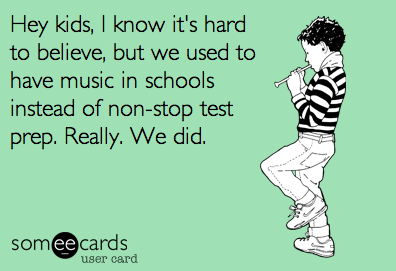Ten Things We Need to Fight to Keep
Education Rethink 2013-04-02
Sometimes I get on a rant against homework or standardized testing or whatever it is that bothers me at the moment and I forget that there are things that I want to advocate for; things that I see slipping away in the midst of testing culture: 
- Social studies: When I visit elementary schools, I notice that they do social studies once or twice a week at the most. It is an untested subject. With the rollout of Common Core, I am watching social studies become an informational reading class. Gone are the debates, the mock trials and the social engagement that make the subject come alive. It is becoming a non-fiction reading class.
- Librarians: I've watched my district move from having one librarian on each campus to having library aides and diverting funds into intervention positions. First it was reading. Next it will be math. I get the need for intervention, but we are losing something profound when we lose librarians. They aren't simply the Dewey Decimal people. They are often the first chance a kid has in falling love with a genre, in learning to do research and in going beyond learning how to read and into reading for a purpose.
- Critical Thinking: The testing culture has taken time away from teaching (in our district, we test seven weeks a year, along with a weekly standardized test). Between the compacted schedule and teaching to the test, teachers are often pushing low-level review instead of the slower, deeper critical thinking.
- Science: Don't get me wrong. We talk about science in the Common Core often. It's a big initiative. Yet, it is more like engineering than science. It's the notion of science for the sake of boosting the economy. But real science, observational science, inquiry-driven science is dying. Like social studies, it is becoming an additional reading class.
- Play: Visit an elementary school and compare the amount of recess students used to get to what they get now. Despite the claim of being "research based," schools ignore the research explaining the benefits of play. It's understandable, I suppose. Nobody asks them about the Monkey Bar Benchmark Assessments.
- Field Trips: I've been watching the number of field trips drop over the years in my district. I'm not sure if this is an issue elsewhere, but there is a sense that field trips are a waste of time.
- Music: Ask around and see how many schools have cut recess or, more subtly, cut down on the time spent in that particular subject, ignoring all the research about music and its relation to success in math.
- Art: Remember all the talk about the "creative class?" Turns out, it somehow doesn't apply to art. This is a tragedy, not just because of its role in creative thinking, but because art is a deeply profound part of being human.
- Reading for Fun: We used to do SSR or DEAR or whatever acronym allowed us to go pick up a novel (or often a non-fiction text) and read. Just because. It built up silent fluency and helped foster a love of reading. I'm seeing less and less of this, because silent reading isn't "observable." Doesn't matter if there is a response at the end.
- Autonomy: The testing culture often pushes teachers into a pedagogy that doesn't work. The response to this failure is to give teachers more initiatives, give students more intervention and force all teachers to move into a more standardized approach. Oh, the words are often "common" or "shared," but it isn't shared. It's imposed. Even the high-performing teachers must follow the lockstep instructions. Teacher autonomy is fading and with the rigid curriculum map and the teach-to-the-test mindset, student autonomy is even more threatened. The sad thing is that autonomy is vital human need and a critical piece to learning.
What am I missing? Anything else?
